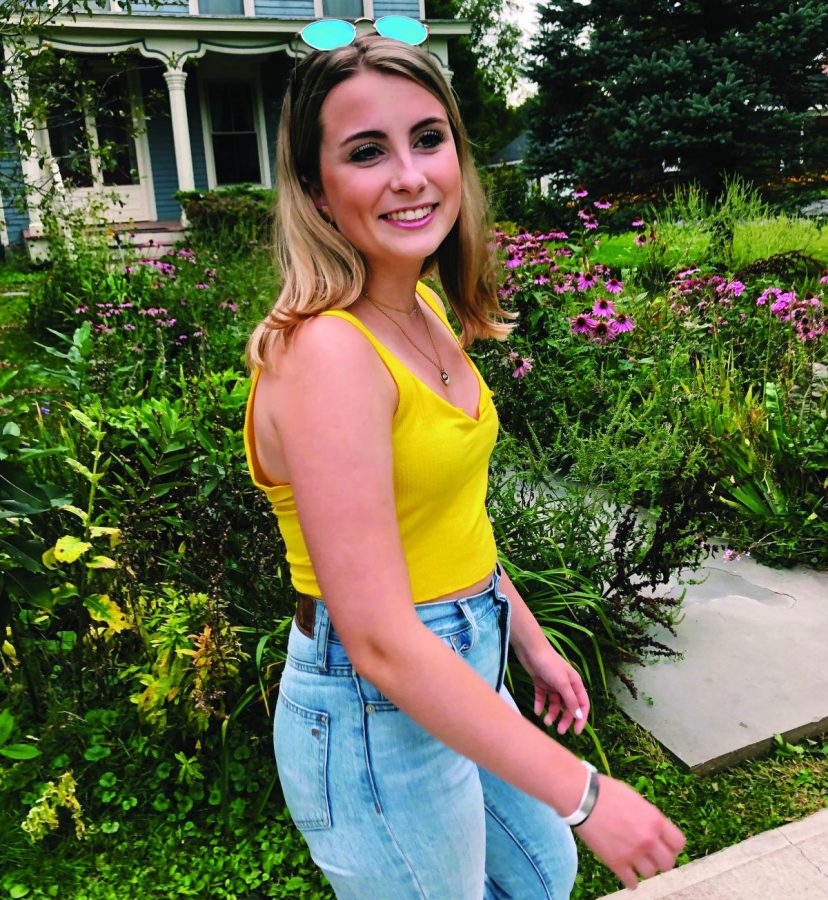Taking Initiative: Helen Ferguson and the Medusa Movement
“I have had to… accept and realize that [Colgate] is not a safe place for everyone and this is not somewhere where everyone feels or is accepted. How am I going to leave it at all different?” senior Helen Ferguson responded when reminiscing on her past four years at Colgate.
She found a way to make that difference with her founding of the Medusa Movement, a student-led activist group on campus that emerged this summer in response to the new Title IX Regulations, which aims to make Colgate a more survivor-centric community.
“I am a survivor and I was really frustrated by the new Title IX policies. It was kind of consuming me this summer,” she said when reflecting on the inspiration for the movement. “I felt like a lot of people, especially on Colgate’s campus, didn’t know it was happening, by no fault of their own. No schools were really talking about it… and there was so much happening (the protests, COVID-19, and racial issues especially on Colgate’s campus)… all those things are so important and we should be talking about [them] but, in conjunction with [Title IX], none of them are mutually exclusive.”
As Aug. 14, the day the new Title IX Regulations would take effect, approached, she decided to reach out to the Konosioni Senior Honor Society for support on speaking up about the new policies. Almost overnight, the Medusa Movement took off and expanded to have a large network of students involved. Since then, she has been in continuous meetings with administration, constantly keeping the conversation going, despite the challenges she faces to get initiatives approved and off the ground.
“There is always a roadblock and there always will be, COVID-19 or not… [So we ask] ‘How do you push them enough [in order for them] to understand how important this is?’ Ferguson said. “We’re not just going to go away.”
When she is not updating the Medusa Movement’s Instagram page or managing meetings with administration members, you are most likely to catch Ferguson typing away essays by the window on the second floor of Case Geyer Library, her favorite spot on campus. Ferguson is a peace and conflicts studies concentrator and philosophy minor from Bethesda, Maryland on the pre-law track, hoping to work in human rights law. In addition to the Medusa Movement, she is a member of the Konosioni Senior Honor Society, the Swinging Gates and Kappa Kappa Gamma. Many factors contributed to her path of becoming such a prominent figure on campus, including her own survivorhood.
“Becoming a survivor on Colgate’s campus and finding networks that could support me and, when there weren’t, working to create them, has definitely been the biggest thing for me that I would say formed my identity from when I walked in to now,” she remarked.
Because of this, her efforts to improve the Colgate community has been driven by a survivor-centric, intersectional and inclusive mindset that has helped to hopefully make the community stronger.
Ferguson continues to work diligently to promote events while also balancing her thesis, which focuses on the war of Afghanistan. Though it is difficult to manage, she continues to maintain her passion and rancor, because she knows that, as a senior, she has the opportunity to make long-standing change. She encourages her fellow senior class members to do the same.
“I think we have seen a lot of cycles through our four years,” she said, referring to the repetition of racist incidents on campus or incidents of sexual assault and injustice in Greek life that some students choose to move on from if it does not concern them.
“We as a class, just from the nature of being here for the longest, have seen that again and again and we have the unique experience that other senior classes haven’t had [by] being here in a really formative time… If not now, when are we going to cut those cycles off? What does that mean? Does that mean Colgate abolishes Greek life? Does that mean we have protests and bigger demands?” Ferguson said. “I don’t know. I don’t have a perfect answer. I don’t think anyone does. But… if we’ve ever been given a chance [for change], this is it.”
The work Ferguson has accomplished is not for the faint of heart. She has become an agent of change and hopes others will rise to the call as well.








